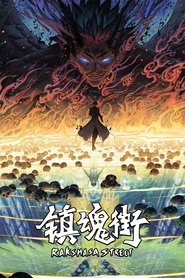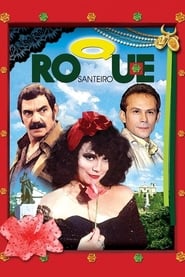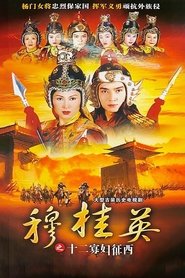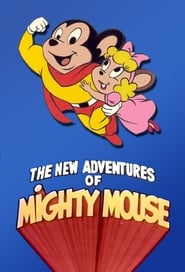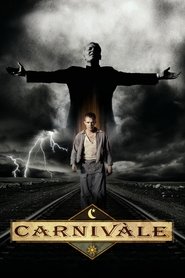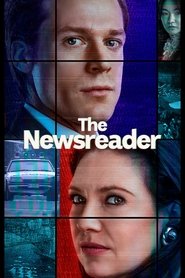Popular Action Adventure TV Series - Page 226
-
Rakshasa Street
2016
Rakshasa Street
2016
star 8.4Requiem Street, where evil spirits are attracted to in order to destroy them. A place where spirits and humans co-exist, not all humans can enter Requiem Street. Only those rare-soul users with guardian spirits can enter. Xia Ling was just a normal university intern, but a meeting by chance changes her ordinary life... In this world full of evil spirits, can you cooperate with your guardian spirit in order to survive? -
Level Up! Project
2017
Level Up! Project
2017
star 8.7One of the most popular Korean girl's groups, Red Velvet, is filming their first travel reality show. -
Roque Santeiro
1985
Roque Santeiro
1985
star 8.9In the tiny poor town of Asa Branca, in the middle of Brazilian Northeast, Roque Santeiro is worshiped as a saint. He was supposedly killed by a bandit, 18 years ago, trying to save the local church. After his disappearance, local leaderships such as landowner Sinhozinho Malta and mayor Florindo, took profit on that to control the humble population. They even make up a widow, Porcina, who should have married Roque secretly before his death. What they don't expect is that Roque is alive, and he's back to, allegedly, "save his people". Now Malta, Florindo, Porcina, and others must hold him down and explain the "truth" to their commoners, in a desperate attempt to save their own bottoms. Meanwhile, mysterious facts surround Asa Branca, such as a Werewolf, a film crew who are trying to shoot a movie about Roque's story, and violent murderers. -
The Haunted Palace
2025
The Haunted Palace
2025
star 7.5In a world of folklore and mysticism, a vengeful spirit and a devoted shaman cross paths, sparking a journey of love and redemption -
The Heroine of the Yangs (II)
1998
After a long period of peace, the Western Xia dynasty invades the Song dynasty, leading to the deaths of Yang Liu Lang and Yang Zong Bao at the hands of Pang Tai Shi. Mu Guiying attempts to lead the female warriors of the Yang family into battle, but is falsely accused and faces many obstacles, including being separated from Yang Pai Feng, who later encounters an amnesiac Yelü Haonan and develops feelings for him. Li Yuanhao, the prince of Western Xia, secretly approaches Guiying and others to deceive them and attempts to use their help to seize the throne. In the end, his scheme is exposed, and he is saved by the Bǎihuā Princess. Guiying is appointed as the commander to fight against Western Xia, but Yuanhao kidnaps Pai Feng and forces Haonan to help him kill his father and seize the throne, as well as to fight against the Song army. Guiying vows to eliminate Yuanhao. -
The New Adventures of Mighty Mouse and Heckle & Jeckle
1979
star 5.8The New Adventures of Mighty Mouse and Heckle & Jeckle is an updated version of Mighty Mouse and Heckle & Jeckle cartoons from the 1940s. The television series was produced by Filmation, and aired from 1979 to 1981 on CBS with over 48 episodes produced. It is not to be confused with Mighty Mouse: The New Adventures. -
Narenare -Cheer for You!-
2024
star 5.8Misora Kanata is a first-year student on the Takanosaki High School cheerleading team. She won a national championship in middle school, but can’t jump after a mistake in a competition. She befriends Suzuha, Shion, Anna, Onka, and Megumi to form the PoMPoMs. Their new team goes beyond cheerleading to reach the hearts of the people they cheer on. They might just change the world! -
Valeria
2020
Valeria
2020
star 7.4A writer in a creative and marital crisis finds refuge and support in her three best friends. Based on the novels by Elisabet Benavent. -
Seven Detectives
2015
Seven Detectives
2015
star 7.4Yū Amagi is a slightly eccentric detective who has been assigned to the Twelfth Section of the Tokyo Metropolitan Police Department's First Investigative Division from the Lost and Found Centre. The Twelfth Section is called the "graveyard of detectives" and ridiculed as the "banishment room where hardened detectives who cannot be fired are sent." Its assembled detectives Kōsuke Samura, Takumi Yamashita, Keita Nagasawa, Tamaki Mizuta, and Masatoshi Katagiri are elite and yet oddballs. Amagi appears fixated with time which seems to have no relation with a case. Raising questions about the timelines of the perpetrator and victim derived from the estimated time of death, time of crime, time of alibi, and time limit, he searches for the meaning of "blank time" which arises from this. He obsesses over the weight of every minute and second of time because of some incident. -
Ransom Canyon
2025
Ransom Canyon
2025
star 6.9Passions run deep in a small Texas town, as three ranching dynasties fight for their land, their legacies and the people they love. -
The Twisted Tale of Amanda Knox
2025
star 7.3Amanda Knox arrives in Italy for her study abroad only to be wrongfully imprisoned for murder weeks later. Follow Knox's relentless fight to prove her innocence and reclaim her freedom and examines why authorities and the world stood so firmly in judgment. -
Pointless Celebrities
2011
star 6.3Alexander Armstrong and Richard Osman present a celebrity version of the general knowledge quiz in which contestants try to come up with the answers that nobody else could think of. -
Why Didn't They Ask Evans?
2022
star 6.6A dying man's enigmatic last words send vicar's son, Bobby Jones, and his socialite friend, Lady Frankie Derwent, on a crime-solving adventure. -
Dad's Army
1968
Dad's Army
1968
star 7.4Introducing the Walmington-On-Sea home guard. During WW2, in a fictional British seaside town, a ragtag group of Home Guard local defense volunteers prepare for an imminent German invasion. -
Carnivàle
2003
Carnivàle
2003
star 7.9Carnivàle is an American television series set in the United States during the Great Depression and Dust Bowl. In tracing the lives of two disparate groups of people, its overarching story depicts the battle between good and evil and the struggle between free will and destiny; the storyline mixes Christian theology with gnosticism and Masonic lore, particularly that of the Knights Templar. -
Deceptions
1998
Deceptions
1998
star 7.6The show's premise revolves around a pair of twin sisters who were separated when they were young, and as adults the younger sister is forced to act as a "replacement" for her wealthy twin who wants to temporarily leave her husband and his family to enjoy a life of luxury with multiple lovers. -
The Newsreader
2021
The Newsreader
2021
star 7.6An unconventional relationship in a world on the cusp of change; a star newsreader and an ambitious bisexual reporter join forces in a ruthless 1986 newsroom, as events unfold that will change their lives. -
Disappeared
2025
Disappeared
2025
star 5.2After a night of partying in the mountains, Jon disappears without a trace. Although his friends seem concerned, they all harbor a grudge against him. -
Dhevaprom
2024
Dhevaprom
2024
star 8Dhevaprom is a Thai lakorn based on the novel of the same name and written by the same writers as its preceding story ... The Five Brothers series, that aired in 2013. Dhevaprom consists of Laorchan, Kwanruetai, Jaiphisut, Dujapsorn and Porncheewan. -
I Am Not Okay with This
2020
star 8Angsty Syd navigates high school awkwardness, family drama and an unrequited crush on her best friend while trying to rein in her budding superpowers.
 Netflix
Netflix
 Amazon Prime Video
Amazon Prime Video
 Apple iTunes
Apple iTunes
 Apple TV Plus
Apple TV Plus
 Disney Plus
Disney Plus
 Google Play Movies
Google Play Movies
 Paramount Plus
Paramount Plus
 Hulu
Hulu
 HBO Max
HBO Max
 YouTube
YouTube
 fuboTV
fuboTV
 Peacock
Peacock
 Peacock Premium
Peacock Premium
 Amazon Video
Amazon Video
 The Roku Channel
The Roku Channel
 AMC+
AMC+
 Kocowa
Kocowa
 Hoopla
Hoopla
 The CW
The CW
 Vudu
Vudu
 Starz
Starz
 Showtime
Showtime
 PBS
PBS
 Pantaflix
Pantaflix
 FXNow
FXNow
 Tubi TV
Tubi TV
 Kanopy
Kanopy
 Comedy Central
Comedy Central
 Crunchyroll
Crunchyroll
 Microsoft Store
Microsoft Store
 Redbox
Redbox
 Sun Nxt
Sun Nxt
 ABC
ABC
 DIRECTV
DIRECTV
 Crackle
Crackle
 Fandor
Fandor
 Plex
Plex
